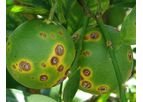Agricultural Industry Manufacturers, Suppliers & Companies
-
Warden Biomedia specialises in the research and development of random filter media for aeration and biological treatment plants. With the philosophy of increased surface area, the eco-friendly biological filter media are manufactured with specific ...
-
For more than 30 years, Lumex Instruments has been developing and manufacturing laboratory and industrial analytical equipment, instruments, and procedures. We offer both traditional and new ingenious solutions, unique technologies and classical ...
Lumex-Instruments - Application Support Services
We place a special emphasis on the development of detailed analysis techniques and most efficient use of our equipment and instruments to solve specific analytical problems. This customized approach is particularly valued by our Customers. Our ...
CONTACT SUPPLIER -
ENERPAT Group established ENERPAT Jiangsu Environmental Protection Industry Co., Ltd. in China, and start to enter the China's. The Enerpat name has become synonymous with recycling equipment. Established in 1936 it now has a 66,000 ft main factory ...
Enerpat - Model EWS - Wood Shaving Machine EWS series
Enerpat wood shaving machine is designed to produce wood shavings in desired and suitable size. Automatic feeding method can help the production line to increase productivity, saving time and labor. ...
CONTACT SUPPLIER -
EnviTec Biogas AG covers the entire value chain for the production of biogas, including the planning and turnkey construction of biogas plants and biogas upgrading plants as well as their commissioning. The company takes charge of biological and ...
-
PremiumSoftware vendorbased in Cambridge, UNITED KINGDOM
Developers of environmental software including the well known Atmospheric Dispersion Modelling System, ADMS. The world leading ADMS-Urban calculates pollution concentrations at street level resolution over urban areas and links seamlessly to ...
ADMS-Urban RML - Innovative Automated System for Nesting ADMS-Urban
The ADMS-Urban Regional Model Link (ADMS-Urban RML) is an innovative automated system for nesting the high resolution air quality model ADMS-Urban in a regional air quality model such as CMAQ, CAMx, CHIMERE or EMEP4UK, using meteorological data from ...
CONTACT SUPPLIER -
Since 1905, Hilliard has been engineering, manufacturing and distributing motion control and filtration products. Our extensive history, expert knowledge of applications and strict quality standards make us a leading industry supplier. Hilliard's ...
-
DSS Steam Trap Manufacturer was established in 2008, after noticing ongoing problems in the industrial manufacturing markets due to the failure of conventional mechanical type steam traps. These products were costly, would fail regularly and cost ...
-
Our company was founded in 1996 by Zeynel Abidin Toptas in Ostim. Our company, which has a corporate structure that aims to provide quality products and services to its customers with continuous development in line with the participation of all our ...
-
atech innovations gmbh started in Oberhausen in 1989, distributing ceramic membranes. Since 1992 we have also been very successful on the market as a manufacturer. While plant construction was initially one of our main activities, today we ...
Clarification of Fruit Juice
Ceramic membranes for the clarification of fruit juice are available at competitive prices through atech innovations. We provide membrane supports from alpha-aluminum oxide for maximum permeability. Through tangential microfiltration clarified ...
CONTACT SUPPLIER -
With decades of experience in ultra-high-pressure technology with operating pressures of up to 4.000 bar WOMA sets standards in the construction of high-pressure plunger pumps and ultra-high-pressure units. Diesel and electrically driven WOMA ...
EcoTherm - Model 600/40 - Compact and Weight-Optimised Single-Axle Trailer
EcoTherm 600: Compact Design, high performance, highest safety. With up to 95°C hot water facades, small pipes, industrial flooring and other surfaces can be easily cleaned, oil and grease can be washed away and coating can be removed. The ...
CONTACT SUPPLIER -
We are a leading European manufacturer of reliable industrial equipment - Made in Germany. Since our foundation in 1912, we have gained over 100 years of experience in reliable engineering solutions that work. Our high reputation and focus on the ...
Koller - Model 30-200 - Trolley Used for Cranless Assembly, Disassembly and Transport of Downhole Tools
Trolleys are used for cranless assembly, disassembly and transport of downhole tools or other cylindric parts. For different tool diameters, the distance between the support rollers is adjustable and for different tool lengths, the center bar is ...
CONTACT SUPPLIER -
Cloud Tech Pvt. Ltd. founded in 2005, is a comprehensive environmental management company in India for delivering high quality environment and refreshing solutions. Over the last many years, research and development has kept Cloud Tech Pvt. Ltd. ...
Cloud Tech - Outdoor Mosquitoes Control System
Cloud Tech Pvt. Ltd. is End to End customized solutions company, we believe in nature, which provides solution for Odour, Mosquitoes and bug control system, Humidification control, Outdoor and Indoor cooling, Dust Suppression, etc. We are the only ...
CONTACT SUPPLIER -
Farmcomp Oy develops, makes and markets modern and reliable electronics products for agricultural use. Our main products are Olli fence energisers and fencing accessories, as well as portable Wile moisture meters that are used for various ...
Wile - Model 500 - Hay and Silage Moisture and Temperature Meter
Wile 500 is a modern, precise and durable moisture and temperature meter for baled hay, haylage, straw and silage. You will no longer need separate moisture and temperature meters, instead you can measure temperature and moisture content easily with ...
CONTACT SUPPLIER -
In the last decades IMKO established as leading manufacturer for TDR moisture measurement instruments. Get to know our experts for precise moisture measurement. We develop, produce and distribute state-of-the art measurement technology and sensors. ...
IMKO - Model TRIME-GWs - Grain Moisture Measurement Analyzer
Special about TRIME is that it completely penetrates the volume of material of 2dm3. It not only calculates data of the moisture close to the surface like the infrared measuring principle but also the water content of the not ground corn. Complex ...
CONTACT SUPPLIER -
With over a century of global experience Landustrie has become a leading player in the field of water and wastewater management. Our basis was laid around 1913. The company was active in the agricultural market sector and involved with polder ...
-
Galaxy Scientific, an industry pioneer in portable optical Near Infrared spectroscopy, is an agile innovator, enabling organizations to use the power of Near Infrared optical spectroscopy to analyze and authenticate important chemicals and ...
-
One of the largest suppliers of incinerators globally. Providing award-winning waste solutions across the Medical, Animal and Municipal sectors. Our standard incinerators range from 10kg/hr - 1,000kg/hr capacity. We also offer a bespoke design ...
Inciner8 - Cattle Incinerators
Bio security is of utmost importance in the cattle industry. A number of high profile outbreaks in recent years has started to shift opinions on managing your own fallen livestock. With landfill and rendering costs still growing now is the time to ...
CONTACT SUPPLIER -
CONSTAB – Masterbatches and Compounds for the packaging industry From heat-resistant to recyclable – highest quality for 50 years. Since decades, we are a leading partner for the plastics processing industry and are among the market leaders in ...
CONSTAB Masterbatches und Compounds - Masterbatches and Compounds for the production of cast-, calandered- and blown films.
CONSTAB Masterbatches and Compounds for the production of cast-, calandered- and blown films ensure customized ...
CONTACT SUPPLIER -
At Jenfitch, Inc., we are developing water treatment chemical solutions for meeting the strenuous demands for the 21st Century. With over 40 years in the water treatment industry, we are concern with developing technologies that help solve the ...
Jenfitch - Chemical for Controlling Citrus Cankers
One of the major issues facing citrus fruit growers is a disease that effects the trees called citrus cankers. JC9450 has been used to effectively control the growth and infectious nature of citrus cankers. By increasing the oxidative energy in the ...
CONTACT SUPPLIER -
For more than 40 years, the Mosa Group has been focusing its production activity on the exchange of technical and marketing experiences between industrial sectors: “Molds“, “Stamping” and “Machines for Agriculture“. We offer a complete range of ...
Irrigation System - Tailor Made Irrigation System
Special applications of rails and trolleys mounted on the existing heating pipes of the greenhouse, instead of the rails supplied with the Mosa system. The tailor made system will also fit inside the lighting systems of the greenhouses and the ...
CONTACT SUPPLIER
Need help finding the right suppliers? Try XPRT Sourcing. Let the XPRTs do the work for you
































